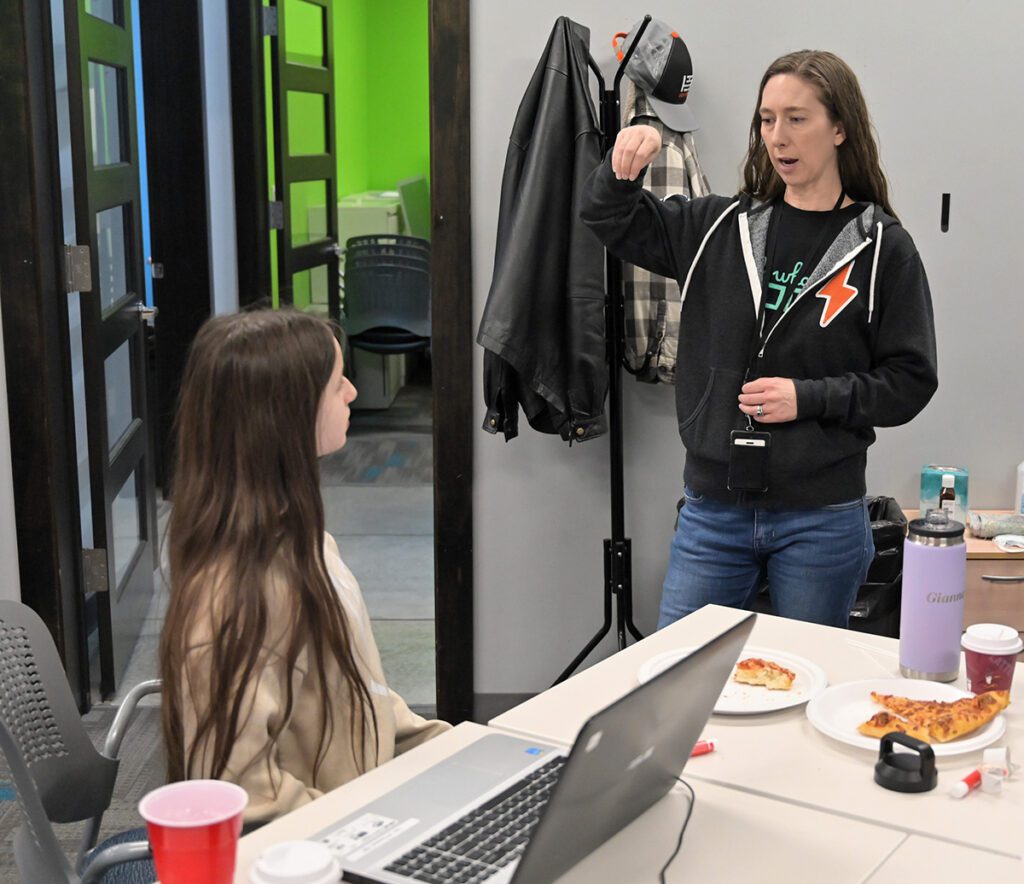Girls Who Code opens opportunities for students

Looking at the numbers, coding is still an industry dominated by men.
With Girls Who Code, NewBoCo looked to even the playing field.
In 2023, NewBoCo had more than 50 local students between 3rd and 12th grade in our Girls Who Code clubs. Taking place every Saturday for 10 weeks in the spring and again in the fall, Girls Who Code was offered free of charge for any student to take part.
“The program focuses on coding, learning about career opportunities, building positive relationships with peers, and doing projects throughout,” says Samantha Dahlby, Director of K-12 Education at NewBoCo. “Our sponsors wanted to help us support a demographic that is typically underrepresented.”
Fixing the balance
According to a survey shared by Statista in 2022, female developers made up just five percent of all respondents. To change that, Dahlby says girls need to learn at an early age that there are opportunities for them in coding. And then they need to be encouraged to pursue those opportunities.
“We’ve had students who are now thinking about majoring in computer science,” Dahlby says. “We had one student who told us that she knew she wanted to start her own business one day, and would need to understand how to have a website.”
One former student is Allyson Schmidt, who works as the Business Development Leader at Bio::Neos, Inc, a software development company in Coralville. In July, Schmidt gave a presentation at EntreFEST in Iowa City, where she specifically credited Girls Who Code with helping her decide to continue studying computer technology at the University of Iowa, where she graduated in 2021.
“I attended Girls Who Code during my senior year of high school, unsure of what I wanted to pursue,” she says. “Surrounded by other girls coding inspired me, and made me feel empowered.”
Dahlby says it’s the community and encouragement of fellow students that makes as much of a difference in Girls Who Code as the coding lessons themselves.
“Some of it’s just getting to know each other’s favorite foods, or other things that create a connection so that when they’re working together they have peers who they feel safe with,” Dahlby says. “Some students start off very shy and hesitant to engage, and now they are leading and engaging and helping other students learn. You can tell their comfort level has changed and they’re feeling more active and engaged in group activities in terms of projects.”
What’s involved

The Girls Who Code camp is broken into two different age groups:
- 3rd-5th Grade Clubs: Aiming to build the foundational skills and understanding of computer science concepts and sisterhood, through a reading discussion and coding activities. Students learn from online tutorials and activities that help them build projects to share with friends and family.
- 6th-12th Grade Clubs: Provides even more hands-on opportunities to learn and practice computer science concepts and sisterhood, with students transitioning to typed coding.
Dahlby noted that even though it’s called Girls Who Code, classes are open to students of any gender.
“The focus is to support female-identifying students and making them feel safe and excited about learning about coding and computer science,” she said. “But we also want to include allies in that, so having those who do not identify as female as a part of the group is a way to fulfill that mission.”
The programs are free for students, thanks to support by sponsors BAE Systems and Collins Aerospace.
Dahlby says programs like Girls Who Code are a crucial part of NewBoCo’s work to ensure equitable access to computer science education.
“I really enjoy that we can find gaps that exist in our community, region, and state, and that we can develop or partner to create programs that address those gaps,” she says.
Here’s where to learn more.
Listen Up
Hear Samantha Dahlby talk more about opportunities for girls in tech on this episode of the Iowa Innovation podcast.
